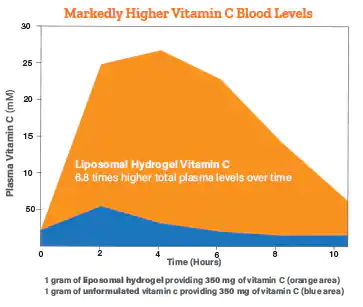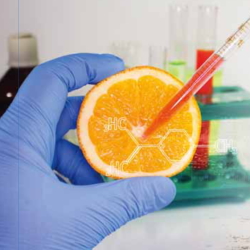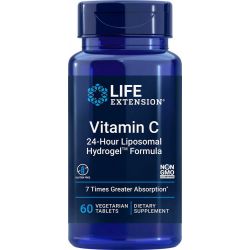A Longer-Lasting Vitamin C
 Unlike most animals, humans cannot produce vitamin C internally.1 This means we must obtain a consistent supply of vitamin C externally, usually by oral ingestion.
Unlike most animals, humans cannot produce vitamin C internally.1 This means we must obtain a consistent supply of vitamin C externally, usually by oral ingestion.
The recommended daily allowance (RDA) of vitamin C set by the Food and Nutrition Board is 90 mg for men and 75 mg for women.1 This dose is based on preventing scurvy. It is inadequate to receive the full benefits of vitamin C.
Research has shown that higher vitamin C doses can improve cardiovascular health, reduce diabetes risk, and lower blood pressure.2
Higher levels of vitamin C intake are also important for immune and cognitive functions and blood vessel structural integrity.2
For those who want to maintain higher sustained vitamin C levels, researchers have created an innovative delivery system with once-a-day dosing.
By nesting plant-based liposomes in a protective hydrogel matrix, absorption of vitamin C is increased, and higher blood plasma levels are sustained.
Consumers can now achieve nearly seven times the bioavailability compared to an equivalent dose of regular unformulated vitamin C.3
Limitations of Unformulated Vitamin C
 Vitamin C is a water-soluble vitamin. As a result it is not stored well in the tissues and thus needs regular replenishment.1
Vitamin C is a water-soluble vitamin. As a result it is not stored well in the tissues and thus needs regular replenishment.1
Vitamin C helps to support healthy immune responses, promote wound healing, produce certain hormones and neurotransmitters, and maintain healthy gene expression.4-7
The federal government’s recommended daily allowance of vitamin C is 90 mg for men and 75 mg for women.1
Some studies show that higher levels can reduce incidence, duration, and severity of the common cold, and help reduce the risk of cardiovascular disease.2,8 Based on the work of the visionary scientist Dr. Linus Pauling, many people have sought to ingest higher levels of vitamin C for its multiple health benefits.
However, achieving high plasma levels of vitamin C isn’t easy.
The challenge is that at doses above 200 mg, unformulated vitamin C is only partially absorbed and rapidly used by the body. Higher oral doses of unformulated vitamin C do not enable an equivalent increase in vitamin C blood levels.
Fortunately, researchers have found an innovative alternative for those desiring to optimize their blood levels of vitamin C.
A Longer-Lasting Vitamin C
 Scientists had been searching for a superior form of vitamin C—one that could deliver higher and more sustained levels of vitamin C into the bloodstream.
Scientists had been searching for a superior form of vitamin C—one that could deliver higher and more sustained levels of vitamin C into the bloodstream.
They found that combining two different plant-based formulation methods markedly improved delivery of vitamin C into the bloodstream.
Both bioavailability-enhancing techniques have been used in the past for other nutrients that suffer from poor absorbability, including curcumin and fisetin.
The first involves liposomes, which are small structures made of plant-derived phospholipids.
Phospholipids are the same types of compounds that make up cell membranes of all living cells. Research shows that encapsulating certain nutrients that have low bioavailability in liposomes improves the nutrient’s absorption into the bloodstream.
But liposomes themselves can degrade. While some of the liposome-encapsulated nutrients get absorbed, others are lost to digestion.
The solution is a second plant-derived compound that protects the liposomes. A hydrogel formed of indigestible fiber called galactomannans surrounds and shields the liposomes, allowing for sustained absorption of the vitamin C released in the intestines. Hydrogel is derived from fenugreek seeds.
This technique using plant compounds enables more vitamin C to be absorbed over a longer period of time.
By comparison, with liposomal hydrogel vitamin C, blood levels continue to rise up to four hours after ingestion and reach a much higher level.
This advanced formulation of vitamin C provides 24-hour plasma coverage.
Taking liposomal hydrogel vitamin C just once a day would lead to much higher around-the-clock vitamin C levels in the blood as vitamin C accumulates and recycles. These levels are greater than can be reasonably achieved with repeated ingestion of regular unformulated vitamin C at the same dosage.

This graph shows total vitamin C plasma exposure increased almost seven times in response to this new hydrogel formula compared to regular vitamin C.9
A new “hydrogel” liposomal formula yields elevated vitamin C blood levels with once-a-day dosing. It reduces the need for higher doses that cause some people gastrointestinal upsets.
The difference isn’t minor. Taking 350 mg of vitamin C in the liposomal hydrogel formula increases the body’s exposure to vitamin C over a 12-hour period by close to seven times that of the same dose of unformulated vitamin C.3
Twelve hours after consumption, the new formula leads to more than 3.5 times higher blood levels than the same dose of regular, unformulated vitamin C.
This improved ability to raise vitamin C blood levels eliminates the need for repeated high doses of regular, unformulated vitamin C to achieve high plasma levels.
 Vitamin C is a potent antioxidant that has shown an ability to help support the immune system, promote wound healing, fight infection, and protect the heart.
Vitamin C is a potent antioxidant that has shown an ability to help support the immune system, promote wound healing, fight infection, and protect the heart.- Humans cannot produce vitamin C, requiring ample oral intake.
- The challenge is that at doses above 200 mg, vitamin C is only partially absorbed and rapidly metabolized in the body.
- Scientists have combined plant-derived liposome and hydrogel formulation technology to improve absorption and prolong vitamin C delivery to the bloodstream.
- The liposomal-hydrogel formula increases blood exposure of vitamin C by close to seven times that of the same dose of unformulated vitamin C. It also maintains much higher levels in the body all day long.
The Importance of High-Dose Vitamin C
Maintaining optimal levels of vitamin C has many health benefits. These include:

- Antioxidant ActivityVitamin C is a powerful free-radical scavenger that can help prevent or reduce oxidative damage, a major contributor to aging and age-related disease.10
- Wound Healing and Tissue Strengthening. Collagen provides strength to connective tissues throughout the body, including in the skin, bones, and cartilage. Vitamin C is required for the synthesis of collagen, helping to keep tissues in peak form and accelerating wound healing after injury.11-13
- Immune System Support. Various cells of the immune system depend on vitamin C for their activation and proper function, including in fighting infections.14 Decades of studies, spurred by the work of Dr. Linus Pauling, have shown vitamin C intake can sometimes reduce the incidence, duration, and severity of colds.15-18 Vitamin C also reduces the airway narrowing and difficulty breathing (due to inflammation) associated with airway irritation and asthma.19,20
- Cardiovascular Protection. A prospective population study found that people with thehighest blood levels of vitamin C are 50% less likely to die due to cardiovascular causes than those with the lowest levels, while another population study found that those with the highest vitamin C levels had a 42% lower risk of stroke than those with the lowest levels.21,22 One reason for this benefit: Vitamin C intake improves blood vessel response to blood flow, or, more specifically, the ability of blood vessels to dilate (widen).23-25
By raising blood levels higher and for much longer than unformulated vitamin C, liposomal hydrogel vitamin C makes it easier to achieve these and other health benefits.
Summary
 Vitamin C is an essential nutrient important for many aspects of health. Humans do not produce vitamin C for themselves, requiring ample oral intake.
Vitamin C is an essential nutrient important for many aspects of health. Humans do not produce vitamin C for themselves, requiring ample oral intake.
The challenge is that at doses above 200 mg, regular unformulated vitamin C is only partially absorbed and then rapidly metabolized in the body.
Scientists have combined two technologies to create an enhanced bioavailable vitamin C formula.
Encapsulating vitamin C in liposomes improves absorption. Encasing the liposomes in a hydrogel composed of indigestible plant fiber protects the liposomes and allows for prolonged absorption in the small intestines.
The combination of these two technologies has led to a vitamin C formula that increases the total amount of vitamin C absorbed and maintained in the bloodstream.
Material used with permission of Life Extension. All rights reserved.
- Available at: https://ods.od.nih.gov/factsheets/VitaminC-HealthProfessional/. Accessed, August 6.
- Available at: https://lpi.oregonstate.edu/mic/vitamins/vitamin-C. Accessed August 6, 2021.
- Akay Internal Study. Liposomal hydrogel vitamin C pharmacokinetics. Data on file. 2021.
- Jafari D, Esmaeilzadeh A, Mohammadi-Kordkhayli M, et al. Vitamin C and the Immune System. Nutrition and Immunity: Springer International Publishing; 2019:81-102.
- Palmieri B, Vadala M, Laurino C. Nutrition in wound healing: investigation of the molecular mechanisms, a narrative review. J Wound Care. 2019 Oct 2;28(10):683-93.
- Moritz B, Schmitz AE, Rodrigues ALS, et al. The role of vitamin C in stress-related disorders. J Nutr Biochem. 2020 Nov;85:108459.
- Afarideh M, Thaler R, Khani F, et al. Global epigenetic alterations of mesenchymal stem cells in obesity: the role of vitamin C reprogramming. Epigenetics. 2021 Jun-Jul;16(7):705-17.
- Schlueter AK, Johnston CS. Vitamin C: Overview and Update. Journal of Evidence-Based Complementary & Alternative Medicine. 2011;16(1):49-57.
- Akay. A cross over pilot pharmacokinetic study of fisetin 1000mg and formulated fisetin 200mg administered in a single dose to healthy volunteers. Manufacturer’s study (in press for future publication). 2020.
- Monacelli F, Acquarone E, Giannotti C, et al. Vitamin C, Aging and Alzheimer’s Disease. Nutrients. 2017 Jun 27;9(7).
- Pinnell SR. Regulation of collagen biosynthesis by ascorbic acid: a review. Yale J Biol Med. 1985 Nov-Dec;58(6):553-9.
- Bikker A, Wielders J, van Loo R, et al. Ascorbic acid deficiency impairs wound healing in surgical patients: Four case reports. International Journal of Surgery Open. 2016 03/01;2:15-8.
- Ravetti S, Clemente C, Brignone S, et al. Ascorbic Acid in Skin Health. Cosmetics. 2019;6(4):58.
- Carr AC, Maggini S. Vitamin C and Immune Function. Nutrients. 2017 Nov 3;9(11).
- Anderson TW, Suranyi G, Beaton GH. The effect on winter illness of large doses of vitamin C. Can Med Assoc J. 1974 Jul 6;111(1):31-6.
- Gorton HC, Jarvis K. The effectiveness of vitamin C in preventing and relieving the symptoms of virus-induced respiratory infections. J Manipulative Physiol Ther. 1999 Oct;22(8):530-3.
- Kim TK, Lim HR, Byun JS. Vitamin C supplementation reduces the odds of developing a common cold in Republic of Korea Army recruits: randomised controlled trial. BMJ Mil Health. 2020 Mar 5.
- Hemila H. Vitamin C and Infections. Nutrients. 2017 Mar 29;9(4).
- Bucca C, Rolla G, Oliva A, et al. Effect of vitamin C on histamine bronchial responsiveness of patients with allergic rhinitis. Ann Allergy. 1990 Oct;65(4):311-4.
- Tecklenburg SL, Mickleborough TD, Fly AD, et al. Ascorbic acid supplementation attenuates exercise-induced bronchoconstriction in patients with asthma. Respir Med. 2007 Aug;101(8):1770-8.
- Khaw KT, Bingham S, Welch A, et al. Relation between plasma ascorbic acid and mortality in men and women in EPIC-Norfolk prospective study: a prospective population study. European Prospective Investigation into Cancer and Nutrition. Lancet. 2001 Mar 3;357(9257):657-63.
- Myint PK, Luben RN, Welch AA, et al. Plasma vitamin C concentrations predict risk of incident stroke over 10 y in 20 649 participants of the European Prospective Investigation into Cancer Norfolk prospective population study. Am J Clin Nutr. 2008 Jan;87(1):64-9.
- Gokce N, Keaney JF, Jr., Frei B, et al. Long-term ascorbic acid administration reverses endothelial vasomotor dysfunction in patients with coronary artery disease. Circulation. 1999 Jun 29;99(25):3234-40.
- Hornig B, Arakawa N, Kohler C, et al. Vitamin C improves endothelial function of conduit arteries in patients with chronic heart failure. Circulation. 1998 Feb 3;97(4):363-8.
- Levine GN, Frei B, Koulouris SN, et al. Ascorbic acid reverses endothelialvasomotor dysfunction in patients with coronary artery disease. Circulation. 1996 Mar 15;93(6):1107-13.


